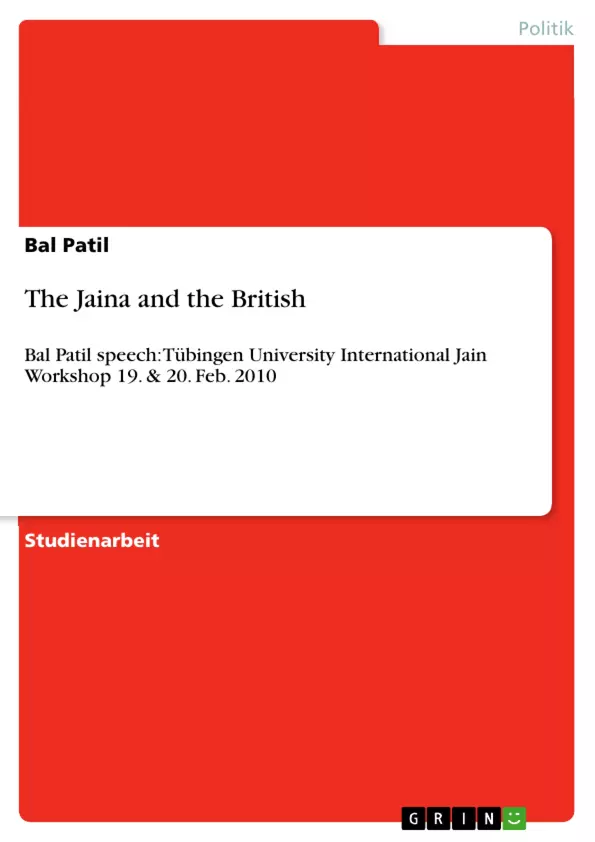Dr. Schweitzer speaks in glowing terms of the principle of Ahimsa non-violence as laid down by Jainism: “The laying down of the commandment not to kill and not to damage is one of the greatest events in the spiritual history of mankind. Starting from its principle, founded on world and life denial of abstention from action, ancient Indian thought and this is a period when in other respects ethics have not progressed very far reaches the tremendous discovery that ethics know no bounds. So far as we know this is for the first time clearly expressed by Jainism.
I propose to discuss Jain minority issue as it has evolved in the last hundred years. The remarkable thing about the Jain minority issue is that it was duly noted by the contemporary British rulers as far back as in 1909. Even more significantly the Census of India has been counting the Jains as a separate religious community right from the first census in 1873. With the dawn of the Indian freedom the Jain community did present its claim for minority status to the Constituent Assembly during the formation of the Indian Constitution.
The entire constitutional, legal and political process of the recognition of the Jain minority status is rendered confusion worse confounded by the interpretative ‘Hindutva’ parameters whether, political, religious and judicial-particularly as evidenced in the latest Supreme Court judgement in my Petition (Bal Patil & anr Vs. Union of India) which has in its obiter dicta stated that the “Hinduism is the common faith of India” and “Jainism is a special religion”.
Inhaltsverzeichnis
- BAL PATIL SPEECH : TUEBINGEN UNIVERSITY INTERNATIONAL JAIN WORKSHOP 19 & 20TH FEB.2010 THE JAINA AND THE BRITISH : JAIN MINORITY ISSUE
- The Principle of Ahimsa and Vegetarianism
- The Concept of Ahimsa in Vedic Culture
- Jain Minority Issue
- The British Recognition of Jainism
- The Jain Community and Minority Status
- The "Hindutva" Interpretations
- Misrepresentation of Jainism in the Media
- Misleading Historigraphy
- Jainism and its Relation to Hinduism and Buddhism
- The Ancient Roots of Jainism
- The Influence of Jain Teachings on Buddhism
Zielsetzung und Themenschwerpunkte
Die Rede von Bal Patil, gehalten bei einem internationalen Jain-Workshop an der Universität Tübingen im Jahr 2010, untersucht die Geschichte des Jainismus, seine einzigartige Rolle in der indischen Geschichte und die besonderen Herausforderungen, denen die Jain-Gemeinschaft in Indien gegenüberstand.
- Die Bedeutung des Prinzips der Ahimsa (Nicht-Gewalt) und der strengen vegetarischen Lebensweise im Jainismus
- Die historische Entwicklung des Jainismus und seine Beziehung zu vedisch-brahmanischem Hinduismus und Buddhismus
- Die Herausforderungen der Anerkennung der Jain-Gemeinschaft als Minderheit in Indien
- Die weitverbreiteten Missverständnisse und Fehlinterpretationen des Jainismus in der Geschichte und in der heutigen Zeit
- Die Bedeutung einer korrekten Darstellung des Jainismus und seiner wichtigen Beiträge zur indischen Kultur und spirituellen Tradition
Zusammenfassung der Kapitel
Die Rede beleuchtet zunächst das Prinzip der Ahimsa und den Vegetarismus im Jainismus, die als zentrale Lehren des Glaubens hervorgehoben werden. Dabei wird die Bedeutung dieser Prinzipien im Kontext der indischen Geschichte, insbesondere im Vergleich zur vedischen Kultur, untersucht.
Im weiteren Verlauf der Rede wird die Geschichte des Jainismus und die Problematik der Minderheitenanerkennung in Indien behandelt. Hier werden die historischen Ereignisse und politischen Prozesse untersucht, die zur heutigen Situation geführt haben.
Der letzte Teil der Rede fokussiert auf die verbreiteten Fehlinterpretationen des Jainismus in der Geschichte und in der Medienlandschaft. Patil kritisiert die einseitige Darstellung des Jainismus und plädiert für eine korrektere und umfassendere Sicht auf diese wichtige indische Religion.
Schlüsselwörter
Die Rede von Bal Patil befasst sich mit den zentralen Aspekten des Jainismus, darunter Ahimsa, Vegetarismus, Minderheitenstatus, Missverständnisse, historische Interpretationen, Indien und die Bedeutung der korrekten Darstellung der indischen religiösen Tradition.
Häufig gestellte Fragen
Welche Bedeutung hat das Prinzip der Ahimsa im Jainismus?
Ahimsa (Nicht-Gewalt) ist das zentrale Gebot, das besagt, kein Lebewesen zu töten oder zu verletzen, was als Meilenstein der spirituellen Menschheitsgeschichte gilt.
Seit wann wird die Jain-Gemeinschaft in Indien separat erfasst?
Bereits seit dem ersten Zensus der britischen Herrscher im Jahr 1873 werden Jains als eigenständige Religionsgemeinschaft gezählt.
Was ist die Problematik des Minderheitenstatus für Jains in Indien?
Es gibt juristische und politische Debatten darüber, ob der Jainismus als Teil des Hinduismus oder als eigenständige Religion (Minority Status) anzuerkennen ist.
Wie beeinflusste der Jainismus den Buddhismus?
Die Rede beleuchtet die antiken Wurzeln des Jainismus und zeigt auf, wie dessen Lehren die Entwicklung des frühen Buddhismus beeinflusst haben.
Was kritisiert Bal Patil an der Darstellung des Jainismus in den Medien?
Er kritisiert Fehlinterpretationen und die Vereinnahmung durch „Hindutva“-Parameter, die den Jainismus oft fälschlicherweise als bloßen Zweig des Hinduismus darstellen.
- Quote paper
- Bal Patil (Author), 2010, The Jaina and the British, Munich, GRIN Verlag, https://www.grin.com/document/157283



